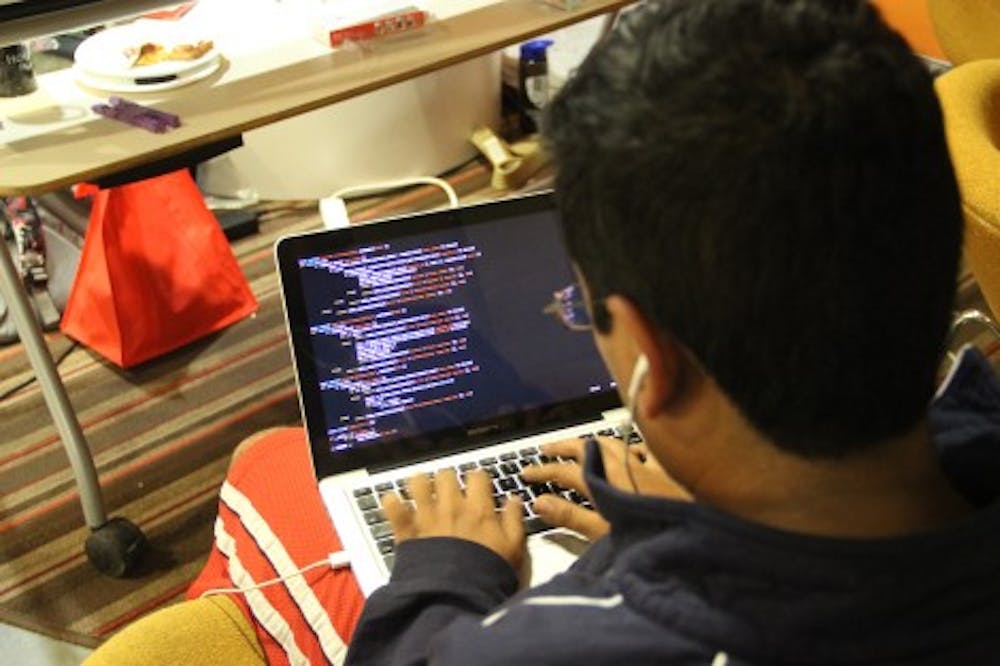By ELLI TIAN
More than 200 undergraduate and graduate students gathered over the weekend in Hackerman and Malone Halls to develop applications and hardware projects during the fifth biannual student-run HopHacks competition.
The hackathon’s participants presented 38 projects on Sunday morning to judges Brian Razzaque of SocialToaster, Travis Poulson from the JH Medicine Technology Innovation Center and Hopkins computer science professors Peter Froehlich and Ilya Shpitser.
After evaluating each entry for its usefulness, polish, creativity and technical difficulty, the judges awarded the grand prize of $1,024 and two Dell tablets to Ph.D. students Ryan J. Smith and Geoffrey Newman for creating the Baltimore Tax Credit Map. The application uses data from the OpenBaltimore API, a public database, to help qualifying Baltimore residents find tax credits for their homes.
“I just wanted to do something useful,” Smith said. “I’m a homeowner myself, and it’s really a pain to think about if and when I should apply for a tax credit. If it was this hard for me to do, how hard is it for a single mother who doesn’t have a lot of time? So we created this tool that could help the community identify people who can help them.”
The second place prize of $512 went to “Team Kronos,” which consisted of sophomore Elena House-Hay and freshmen Bilal Sadik and Elaine Wong. The trio presented an application that used the Myo, a wireless motion-sensitive armband, to generate Morse code and facilitate typing for amyotrophic lateral sclerosis (ALS) patients via simple hand gestures.
“I was really pumped about working with the Myo and I had recently watched The Theory of Everything,” Wong said. “We sat around thinking for a while, and then I thought of Stephen Hawking. ALS has been a huge thing in the media, and we thought we could bring awareness to it.”
The third place prize of $256 went to Georgetown students Casey Knerr and James Pavur for PiSpy, a network security device built from a single-board computer called the Raspberry Pi.
Among the other submissions were SafeRock, which searches for the safest route between two places in Baltimore; Big Dog Data, which aims to simplify the visualization and analysis of large data sets; and BuellerBoard, which can create piano keyboard notes out of any audio file. These projects and several others were recognized by the event’s sponsors, which included Google, Accenture and Booz Allen Hamilton.
Collegiate hackathon league Major League Hacking (MLH) supplied the hackers with some of the latest tech gadgets, high-end laptops and coding and career workshops. They also helped provide the participants with a large supply of sandwiches, pizza, snacks and Red Bull.
Shy Ruparel, a representative for MLH, said that the league agreed to sponsor HopHacks because the event met the quality that MLH was looking for.
“The team was full of passion and looking to create an event full of the right ideas,” Ruparel said. “The food is great, the snacks are great, but that’s not what’s important. Hacker happiness is really important to us, and the environment that HopHacks provides is perfect for that.”
HopHacks was the brainchild of several Hopkins students (some now graduated), including Daniel Swann. Swann, a graduate student in computer science, is in his fifth year at Hopkins.
“We thought it was a really great idea and we wanted to bring it to Hopkins to foster a spirit of entrepreneurship,” Swann said. “And now there are so many amazing people here from different schools. I know they’re going to create amazing things.”
However, not all of the participants were as confident about their ability to finish a project within 36 hours. One hacker described how her team didn’t get everything working until 5 a.m. on Sunday morning.
“We didn’t even decide what languages we were using until 11 p.m. [Saturday] night,” the participant said. “If you don’t have any background in CS, if you don’t know anything, it’s a very steep learning curve. But whatever happens, happens. It’s definitely worth doing if you have the time, because you learn a lot.”
Ruparel agreed with this sentiment, mentioning that the process is often the most rewarding for new hackers.
“I always meet people who are like, yeah, I’m a little uncertain about what I’m going to do,” Ruparel said. “But it’s really empowering to come in and work with new people.”
At the end of the weekend, many hackers might have felt ready to finally get some sleep, but the winners showed no signs of slowing down.
“We have a lab meeting tomorrow morning and manuscripts to work on,” Smith said. “There’s also another hackathon next weekend. I’ve got a side project, figuring out how to prevent people from getting their homes foreclosed, and I might try to do something with that.”
Correction: The article previously stated that one of the co-founders of HopHacks, Daniel Swann, got the idea for the event after attending a hackathon at the University of Pennsylvania. However, it was another of the eventual co-founders who attended the UPenn event and received the first inspiration for HopHacks.

















